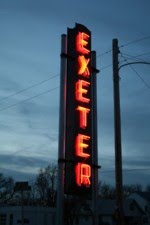
Looking Through the Glass – by Rhoda Wahl, Exeter-Milligan Language Arts Teacher
Lewis Carroll’s timeless story, of a young girl who steps through a mirror into another
world, is considered classical fiction. At Exeter-Milligan School, however, students are
turning fiction into reality as they mentally step through the glass screen of their laptops
into the classroom of the world. Last fall, Exeter-Milligan was given the opportunity to
work with Apple Computers in a 1-to-1 Laptop Initiative. Since then, both teachers and
students have been exploring the world through the glass of a computer screen.
As an English teacher, I feel as out-of-place as Alice in the Looking Glass house. How
can computers improve my students’ reading and writing? To answer that and a myriad
of other questions, I find myself stepping through the glass myself. With each tentative
step, my students and I learn something new. Here’s what we have learned so far:
Creative writing is much more fun in color. Colorful fonts and formatting options
personalize a “Teacher-made-me-write-it” essay into a meaningful creation.
Research just got easier – and harder. Internet access and electronic libraries make
information easy to locate. The drawback is that having too many choices can look
daunting to a novice researcher.
Keyboarding skills make the writing process go faster. Spelling and grammar checks
are now accompanied by a proofreader that identifies overused or vague terms (and
other writing faux pas that can make a teacher cross-eyed. Another useful feature of
our word processing package is a speech function that reads selected text back to the
writer. This helps identify awkward sentences and word errors.
Editing and Revising is less painful for both teacher and student. Teachers and peer
editors can locate errors and insert comments or suggestions without bleeding red ink
all over a page. Revisions and corrections can be made quickly without having to
start all over on a blank page.
Publishing a finished piece of writing is neat, attractive, and eco-friendly. Through
the use of digital drop boxes, students and teachers can pass a document back and
forth until it is polished and ready to print. This eliminates two or three printed drafts
per student, which is both economical and ecologically sound.
Student time on task has improved. Reticent writers are spending more time creating,
revising, and publishing digitally than they do with paper and pen. They love to read
each others writing, and take pride in getting “published”.
Looking at the world through the glass can be confusing and seem backward, but I’ve
stepped through the portal. English class will never be the same again.

No comments:
Post a Comment